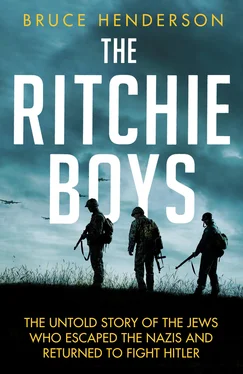1 ...8 9 10 12 13 14 ...24 “I’m going to have this baby,” she told the doctor and her worried husband. “And we’re both going to survive.”
Near the end of her life, Stephan saw his mother growing weaker, but even when she was hospitalized for the last time, he was too young to seriously consider the possibility that she would really die and leave him for good.
He was with his father, packing boxes in the back of the tobacco store, when the hospital telephoned. His father hung up the phone and said heavily, “She’s gone, my son. Your mother is dead.”
They sat down together on a wooden crate and cried. It was the first time that Stephan saw his stern father show any emotion.
“We are all alone now,” Arthur said, weeping. But, he reassured his son, they would be all right, because they had each other.
Then came the loan default, bill collectors, and furniture movers. Arthur lost their two-bedroom apartment in downtown Berlin; he could afford only a sparsely furnished room that came with kitchen privileges and a shared bathroom.
Sitting his son down for a talk, Arthur said in his most serious tone, “Do you remember what I told you about where I grew up?”
Stephan nodded.
“You are a good boy, and I am not doing this to punish you. But for your own good, I have decided to send you to the orphanage.”
“But, Papa, you said we’ll be all right, because we have each other.”
“This is not open for discussion,” said his father. He would not be dissuaded by sentiment or emotion. “I am familiar with the place. I feel sure you will receive proper care and supervision.”
A few days later, Stephan’s father took him to the Auerbach Orphanage. The ornate, three-story structure at Schönhauser Allee 162 was topped with a towering spiral; it had been built in the late 1800s as a beer brewery and still had a dank, dark interior. Stephan waited in a long hallway while his father went into an office.
When his father reappeared, Stephan could tell he wasn’t interested in a prolonged good-bye. He said Sundays were visiting days, bent down for a quick hug, then backed away and shook the boy’s hand.
Stephan, his heart beating rapidly, was left alone in the hallway.
An older boy soon appeared and led him to the boys’ dormitory, where Stephan unpacked his small suitcase. That night, he covered his face with a pillow so no one would hear him cry. When he woke the next morning to a clanging bell, his pillow was damp from tears.
One hundred children lived at the orphanage, all of them Jewish. Most had no parents, though there were some, like Stephan, whose single parents were unable to raise them for various reasons.
During the week, the children attended a public school, but other than that, they stayed at the orphanage. There were many rules, and if they behaved and had local relatives, they could visit them on Sundays, though they had to be back by 6 P.M. Having been raised in a home with a strict father aided Stephan’s adjustment to the authoritarian atmosphere.
Spring 1933 arrived; Hitler rose to power, and the orphanage, like the rest of the country, found itself abuzz with news of all the political happenings and the new anti-Semitic laws. The Nazis were banning Jews from holding public office and closing many professions to them, not only in civil service but in radio, newspapers, teaching, and theater arts.
“Stephan,” one friend said, “there will be nothing left for us when we grow up.”
When he heard about the boycott of Jewish-owned businesses, Stephan worried about his father. Would he be able to keep his shop? He knew his father called himself a socialist. Although Stephan didn’t know what that meant—he was still only eight years old—the older boys who read the newspapers told him that socialists were among the people being rounded up by the Nazis.
Seven-year-old Stephan Lewy in the yard of the Baruch Auerbach Jewish Orphanage in Berlin, 1932. (U.S. Holocaust Memorial Museum)
Not long after, Stephan was called to the superintendent’s office. A grim-faced man behind a desk said, “I am sorry to tell you that you will not be allowed to go home for a Sunday visit until further notice.”
“But—what did I do?”
“The request came from your father.”
Stephan left the office weeping and confused. What had he done to make his father not want to see him? First his mother had died, and now this. He was alone in the world with no one who loved him. His wounded feelings soon turned to anger at Arthur, who he believed had completely abandoned him.
Months went by. Stephan heard nothing from or about his father. Then the mother of a friend from the orphanage, who had been bringing Stephan home with her son for Sunday visits, told Stephan the truth. The Nazis had arrested his father and were holding him in a concentration camp. The orphanage officials had tried to protect him from this terrible news, but she believed the boy should know why he was unable to see his father.
Arthur Lewy had been sent to Oranienburg concentration camp, one of the first detention facilities established by the Nazis after they came to power. Located in the town of Oranienburg, near Berlin, the camp’s initial purpose was to hold Hitler’s political opponents from the region, and by 1933, it was crowded with Social Democrats, socialists, and communists, along with others deemed “undesirable.” The SS took over the camp in mid-1934 and often marched the prison-uniformed inmates out for the day to perform hard labor.
Arthur was released from Oranienburg in 1935, after suffering a heart attack, and was admitted to a Jewish hospital in Berlin. Shortly after his discharge, he came to the orphanage to see his son. This time, he gave Stephan a big hug and kisses on both cheeks as they were reunited, standing in the same hallway where father and son had parted two years earlier. As overjoyed as Stephan was to see his father, he found his appearance deeply alarming. Arthur was missing most of his teeth, and his once solid build had withered.
A friend had kept the tobacco shop running in his absence, Arthur told Stephan, but the new laws made it difficult for Jews to own businesses, and he was being pressured to sell out for a low price to a non-Jew. “People are taking advantage of the situation,” he lamented. Now he was back to living in a rooming house.
As they talked, Stephan could not believe how his father had changed. Not only physically, but he had a warmer, less stern manner about him.
Stephan had changed, too. In the institutional setting of Auerbach, the little boy who had always tried hard to please had become proficiently mischievous. He was rarely caught doing anything wrong, however, even when he carried off pranks like leading boys through airshafts to spy on the girls as they took showers. And for the most part, Stephan obeyed the rules. He also did well in his studies.
As a reward, in early 1938, shortly after his bar mitzvah, he became a shamus, which meant he would be responsible for opening the synagogue, which also served the local Jewish community, on the top floor of the orphanage. Each morning, Stephan reset the Torah scrolls for the day’s reading and turned on the electric organ to warm it up. The older boys at the orphanage attended services three times a day. They learned to conduct services, too, and studied Hebrew so that they could read the scriptures. Surrounded by their religion, they lived Judaism at Auerbach Orphanage—in Stephan’s case, more fully than he had at home.
The neighborhood school had a mix of Jewish and non-Jewish students, with the boys and girls segregated. One day, a group of adults entered Stephan’s classroom: a nurse, a doctor, a policeman, and a Nazi official, all in their respective uniforms. The official announced they would be taking “Aryan measurements,” and ordered all the Jews—there were ten or twelve in the class, most from the orphanage—to stand in one corner. The other forty boys formed a wide circle, with the adults in the center. One by one, each stepped forward so the doctor could use a mechanical device to measure the size and shape of his skull. The doctor made other measurements, such as the distance between their ears and the length of the brow and nose, calling out the figures to the nurse, who wrote them down in a book. They used a board filled with color samples to match and document the color of each boy’s skin, eyes, and hair.
Читать дальше












